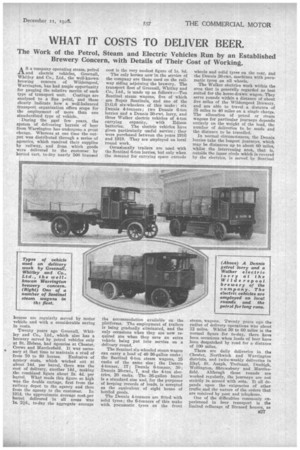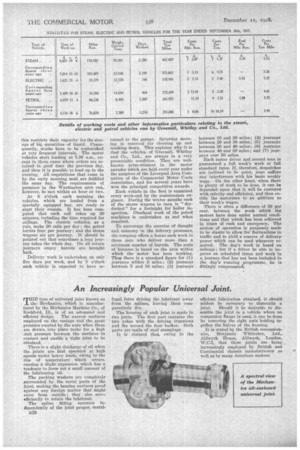WHAT IT COSTS TO DELIVER BEER.
Page 11

Page 12

If you've noticed an error in this article please click here to report it so we can fix it.
The Work of the Petrol, Steam and Electric Vehicles Run by an Established Brewery Concern, with Details of Their Cost of Working.
AS a company operating steam, petrol and electric vehicles, GreeneII, Whitley and Co., Ltd., the well-known brewing concern of Wilderspool, Warrington, has had ample opportunity for gauging the relative merits of each type of transport unit. Costings are analysed to a fine point, and these clearly indicate how a well-balanced transport organization offers scope for the employment of more than one standardized type of vehicle..
During the past few years, the system of delivering barrels of beer from Warrington has undergone a great change. Whereas at one time the output was distributed through a series of agencies, which received their supplies by railway, and from which goods were delivered to the customer by horsed cart, to-day nearly 500 licensed
houses are regularly served by motor vehicle and with a considerable saving in costs.
Twenty years ago Greenall, Whitley and Co., Ltd., which also has a brewery served by petrol vehicles only at St. Helens, had agencies at Chester, Crewe and Macclesfield. It was neces` sary at that time to maintain a stud of from 70 to SO horses. Exclusive of agency costs, which worked out at about I4d. per barrel, there was the cost of delivery, another 146 making the combined figure about 2s. 46. per barrel. What made this figure so high was the double cartage, first from the railway depot to the agency and then from the agency to the customer. In 1914. the approximate average cost per barrel delivered in all areas was 2fd., to-day the aggregate average cost is the very modest figure of is. 8d.
The only horses now in the service of the company are those used on the railway siding adjoining the brewery. The transport fleet of Greene% Whitley and Co., Ltd., is made up as follows :---Ten Sentinel steam wagons, five of which are Super Sentinels, and one of the D.G.6 six-wheelers of this make; six Dennis 4-tonners ; two Dennis 6-ton lorries and a Dennis 30-cwt. lorry, and three Walker electric vehicles of 4-ton carrying capacity, with Edison batteries. The electric vehicles have given particularly useful service ; they were purchased between the years 1916 and 1019. They are employed on local round work.
Occasionally trailers are used with the Sentinel 6-ton lorries, but only when the demand for carrying space exceeds the accommodation available on the platforms. The employment of trailers is being gradually eliminated, and the only occasions when they are now required are when they save an extra vehicle being put into service on a delivery round.
The Sentinel six-wheeled steam wagon can carry a load of 40 36-gallon casks ; the Sentinel 6-ton steam wagons, 25 casks of the same size ; the Dennis 4-tonner, 17; Dennis 6-tonner, 30; Dennis 30-cwt., 7, and the 4-ton electric, 20 casks. The 36-gallon barrel is a standard size and, for the purposes of keeping records of loads, is accepted as the equivalent of eight boxes of bottled goods.
The Dennis 4-tonners are fitted with solid tyres; the 6-tonners of this make with. pneumatic tyres on the front wheels and solid tyres on the rear, and the Dennis 30-cwt. machines with pneumatic tyres on all wheels.
The Walker electrics work within the area that is generally regarded as best suited for the horse-drawn wagon. They serve rounds within a distance of about five miles of the Wilderspool Brewery, and are able to travel a distance of 35 miles to 40 miles on a single charge. The allocation of petrol or steam wagons for particular journeys depends entirely on the weight of the load, the number of deliveries to be made and the distance to be travelled.
In normal circumstances, the Dennis lorries take the longest journeys, which may be distances up to about 60 miles, whilst the intervening area, that is, outside the inner circle which is covered by the electrics, is served by Sentinel
steam. wagons. Twenty years ago the radius of delivery operations was about 12 miles. Whilst 50 to 60 miles is the normal figure for to-day, there have been occasions when loads of beer have been despatehed by road for a distance of 100 miles.
There are daily deliveries in the Chester, Northwich and Warrington districts, and twice-weekly deliveries in Ehyl, St. Aeaph, Trefnant, Denbigh, Wellington, Shrewsbury and l'dacclesfield. Although these rounds are worked regularly, the journeys are not strictly in accord with rota: It all depends upon the exigencies of other traffic and the nature of the orders that are received by post and telephone.
One of the difficulties • commonly experienced in beer transport is the limited cellarage of licensed houses, as B27
this restricts their capacity for the storage of big quantities of liquid. Consequently, stocks have to be replenished at very frequent intervals. The motor vehicles start loading at 7.30 a.m., except in those cases where orders are received in good time the previous day, and then it is possible to load up in the evening. All requisitions that come in by the early morning mail are fulfilled the same day. The requirements of premises in the Warrington area can, however, be met within an hour or two.
At 8 o'clock each morning the vehicles, which are loaded from a specially equipped bay, are ready to start their rounds. It has been computed that each call takes up 20 minutes, including the time required for stiilage. The electric vehicles, as a rule, make 20 calls per day ; the petrol lorries four per journey ; and the steam wagons six per journey. It should be pointed out that sometimes a long journey takes the whole day. On all return journeys empty barrels are brought back.
Delivery work is undertaken on only five days per week, and by 5 o'clock each vehicle is expected to have re
turned to the garage. Saturday morning is reserved for cleaning up and washing down. This explains why it is that the vehicles of Greenall, Whitley and Co., Ltd., are always in a very presentable condition. They are wellknown prize-winners in the motor parades which are held every year under the auspices of the Liverpool Area Committee of the Commercial Motor Users Association, and for several years have won the principal competitive awards.
Each vehicle in the fleet is examined every week-end by the maintenance engineer. During the winter months each of the steam wagons in turn is " drydocked " for a fortnight for boiler inspection. Overhaul work of the petrol machines is undertaken as and when required.
To encourage the exercise of thought and economy in the delivery processes, the company offers a bonus each week to those men who deliver more than a minimum number of barrels. The scale of bonuses is based on the area within which the motor has been working. Thus there is a standard figure for (1) journeys within 5 miles ; (2) journeys between 5 and 10 miles; .(3) journeys between 10 and 20 miles; .(4) journeys between 20 and 30 miles; (5) journeys between 30 and 40 miles; (6) journeys between 40 and 50 miles; and (7) journeys over 50 miles.
Each motor driver and second man is guaranteed a full week's work at full standard rates. If, therefore, despatches are inclined to be quiet, none suffers any interference with his basic weekly wage. On the other hand, when there is plenty of work to be done, it can be depended upon that it will be executed with celerity and efficiency, and thus entitle the motormen to an addition to their week's wages.
There is often a difference of 30 per cent. between the work which the motors have done under normal conditions and that which has been achieved in times of rush and emergency. The system of operation is purposely made to be elastic to allow for fluctuations in traffic and to yield a reserve of delivery• power which can be used whenever required. The day's work is based on mileage; but if a driver be able to improve on scheduled times and work in a journey that has not been included in the day's running programme, he is fittingly compensated.






























